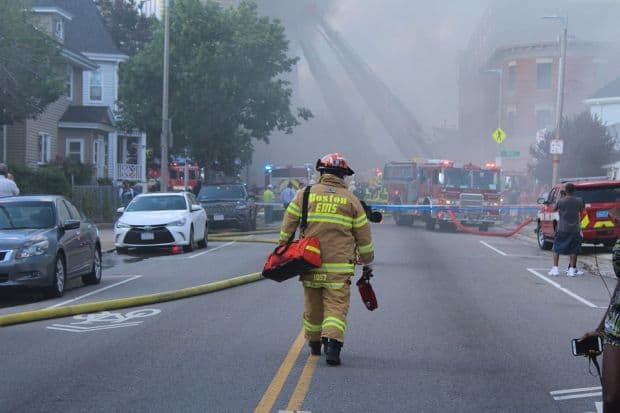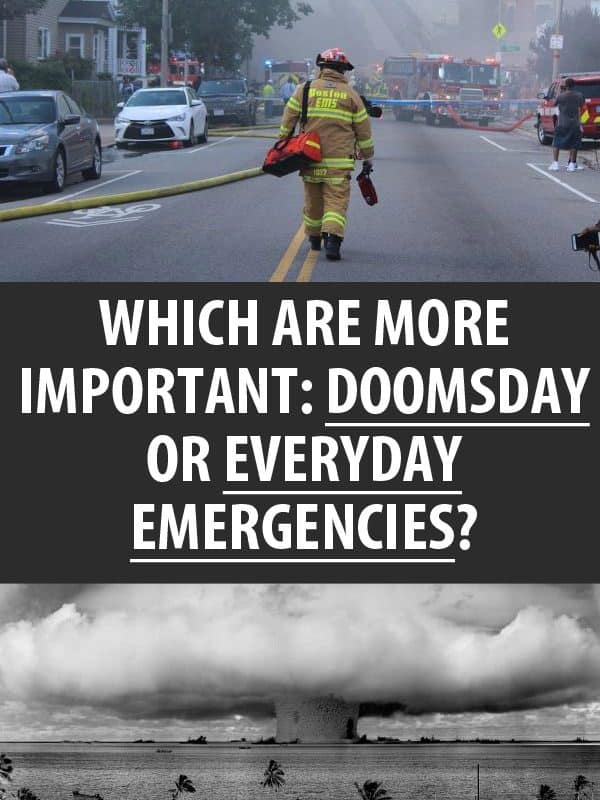There are so many different reasons that people prep. This is partly because the reasons to prep depend greatly on your personal situation, your beliefs, and your skills. But the other main difference between many preppers is they type of event they are getting ready for.
Some preppers believe it’s a huge event like a solar flare or EMP, or that a global economic crash is looming. Still others are preparing for the next storm or other natural disaster.
You’ve seen those Doomsday Prepper shows where the guy is spending all his time and money building an underground bunker for his family to hide in, right? Those are the more extreme examples of doomsday preppers.
But some preppers are focused primarily on being prepared for everyday emergencies, such as a power outage, a fall injury, an accident, a car break down, or a home invasion. These are your overprotective moms and dads who are always prepared with a first aid kit, a powerful flashlight, or a fire extinguisher when something goes wrong.
But no matter which event or series of events preppers believe is coming, they all fall into either the doomsday or everyday emergencies category. (I put natural disasters in the everyday emergencies category because they are typically a short-term impact and things go back to normal relatively quickly.)
So, which is really more important for prepping: Doomsday or Everyday emergencies? First, we’ll clarify the type of events in each of these categories and some general ways to plan for each of the categories, and then we’ll try to answer the question of which is more important to prep for and why.

Everyday Emergencies
These are the events that are more common and typically impact one individual, one family, or maybe just one neighborhood, or community.
Although things may be chaotic during and immediately after the event, things get back to normal fairly quickly. In some cases, life may continue normally for others even though you personally are in upheaval.
The other important thing to understand about everyday emergencies is that they are often completely unpredictable. Luckily, there are some things you can do to increase your odds of surviving everyday emergencies if and when they happen, even if there isn’t a lot you can do to stop them from happening.
- Home Invasion or Burglary
- Car Accident
- Power Outage
- Car Break Down
- Street or Bar Fight
- Drowning or Boating Accident
- Unexpected Fall
- Hiking Injury
- Chemical Spills
- House Fire
- Dog Attack
- Temporary loss of Job/Income
- Major Surgery/Other Illness
- Floods/Tornadoes/Hurricanes
Ways to Prepare for Everyday Emergencies
While you can’t get everyone completely prepared for every emergency that could come your way, there are a number of different actions you can take to ease the chaos and stress of everyday emergencies. Prepping for everyday emergencies generally involves a more short-term plan.
- Be aware of the proper safety precautions related to any activity you participate in and follow them to minimize risk. You might be surprised at how little things such as wearing a seat belt when driving, life jacket when boating, motorcycle helmet when riding, or proper footwear when hiking, can minimize risk.
- Purchase and install the proper monitoring and alarm equipment such as smoke detectors, a security system, fire escape ladders, a panic or safe room)
- Understand everyday carry (EDC) and put together your own EDC kit.
- Identify and purchase the proper insurances including car insurance, flood insurance, fire insurance, health insurance, and renter or homeowner insurance.)
- Put together an EDC first aid kit and make sure it’s easily accessible at all times.
- Plan and practice the proper safety drills for likely events in your area such as a wildfire, tornado, hurricane or events such as a home invasion, blackout, etc.)
- Take steps to protect vital documents and valuables (cloud storage, flash drive, fireproof safe, plan for pets, etc.)
- Plan to protect your property and home as much as possible. This can include things such as having storm shutters ready, installing window bars, clearing dead brush and bushes away from your home, and reinforcing door locks, etc.
- Learn about first aid, CPR, and other medical interventions and practice so you are confident in your abilities and can spring into action when an emergency arises.
- Create a plan to pay off debt and establish an emergency cash fund that can cover 3-6 months of expenses if you are injured, hospitalized, or must relocate.
- Prepare and store a comprehensive car BOB so you are prepared to handle emergencies that may happen to/from home or work.
But if you focus all your time and energy on prepping for these more common emergencies, will you be prepared for a doomsday event when it comes?
Doomsday Events
These are the events or series of events that have the potential to change the world as we know it. Following a doomsday event, life will be extremely different in some way or often in multiple ways, for a huge percentage of the population.
Doomsday events are more widespread and impact a great number of people within a short period of time. Often times a doomsday event will impact entire states, regions, or even the entire globe.
This means prepping for doomsday events must take into consideration that infrastructure, systems, and utilities we depend on will be overwhelmed or inoperable. Doomsday prepping is by nature more focused on long-term planning and survival.
- Solar Flare or Super Nova
- Large Scale Natural Disasters
- EMP
- Nuclear War
- Global Economic Crash
- Yellowstone Eruption or Other Super Volcanoes
- Pandemic
- Armageddon
How to Prepare for Doomsday Events
- Identify the potential threats related to the doomsday events you believe are most likely for your area.
- Stockpile needed items such as water, food, water, medicines, weapons, etc.
- Put together a get home bag (GHB) and a more extensive bug out bag (BOB) or get out of dodge (GOOD) bag.
- Create a plan to bug in and/or bug out as needed.
- Practice your bug out plan frequently and revise often to reflect new information and skills
- Consider learning and practicing skills that will be in demand following a doomsday event.
- Learn and practice self-defense and hunting using a variety of weapons.
Many people are extremely focused on doomsday prepping, but does this mean they are automatically ready to handle some of the more common everyday emergencies?
Final Word About Doomsday Prepping vs. Prepping for Everyday Emergencies
We’ve given you some ideas of things you can do to prepare for everyday emergencies and for large scale doomsday events. The lists above are general actions and are by no means comprehensive.
Some of your preps for events in either category will also depend on whether you are trying to survive in an urban location or whether you prefer to survive in a more rural location.
When it comes down to which is more important for prepping: doomsday or everyday emergencies, I truly believe it’s best to prep with both types of events in mind.
There are huge benefits to prepping for everyday emergencies and many of those preps will help you, at least somewhat, for a doomsday event. But if you are focused only on surviving a short-term emergency, you will have a difficult, if not impossible, road when faced with that aftermath of a doomsday event.
Instead of telling you to prep only for everyday emergencies or only for a doomsday event, I’m going to say do a little of both.
- Make a list of the everyday emergencies you feel are most likely in your area and for your personal situation.
- Then make a list of the doomsday scenarios that you feel are the most likely threats.
- List the dangers for each of these situations or events.
- Identify the common threats among both types of events.
- Start prepping for these threats that overlap first.
Do you feel strongly that either prepping for doomsday or for everyday emergencies is more important? If so, share your thoughts below, we’d love to hear your reasons.


Born and raised in NE Ohio, with early memories that include grandpa teaching her to bait a hook and watching her mom, aunts, and grandmothers garden, sew, and can food, Megan is a true farm girl at heart.
For Megan, the 2003 blackout, the events of 911, and the increasing frequency of natural disasters like Hurricane Katrina, spurred a desire to be more prepared. Soon to be living off-grid, this mother of four and grandmother of ten is learning everything she can about preparedness, survival, and homesteading.

If you are prepared for everyday stuff, you will also be prepared for doomsday.
Megan, I am a mother of 6 and grandmother of 13. When I was in grade school it was on my heart to prep. Now, I understand that it is to help others (especially children who are the most vulnerable).
What am I doing now?
I have been a real estate broker for over 40 years. My husband and I have the beginnings of a non profit camp for kids with an emphasis on Godly character qualities which are seen in nature/His creation. We will not preach. We will emphasize life and homesteading skills of which mine are minimal. These kids should become a blessing to all they come in contact with as they recognize their life purpose.
One of my main problems is lack of knowledge. I can see that these “emergencies” are wonderful warnings to enable us to have time to care, love, and prepare! (There would be no need for all of this if we had lived out life as God designed for us.)
I have many many ideas.
I am hoping this same burden for the children is on the heart of many capable leaders across America.
Please feel free to contact me if you wish! Wish I was a farm girl! Thank you for sharing!
Georgia Thurman
I explain to my “audience” that reads my book “When The Shit Hits The Fan In Callahan – Plan” to prepare at a minimum for being without electrical services for 366 days … or less, say for about 5 months minimum (the “Time of the Locusts” mentioned in the Book of Revelations in your authorized King James version of the Holy Bible of 1611).
I suggest to them that they make a list of every conceivable consequence of not having defensive weaponry, clean drinking water, clothing, credit, cash, etc. in that time frame. Each make up their minds what their priorities are … and that barter is business and better than battle when possible.
***Which are More Important Doomsday or Everyday Emergencies(?)***
This appears to be an opinion issue, so for what it’s worth I’ll give mine. I’d maintain that the “everyday” stuff is factored into everybody’s thinking, no matter how “prepared” or “unprepared” they are. Most everyone figures they’re doing ok. So by default the “doomsday” issues are worse. Now for more opinions on the Doom stuff.
*Solar Flare* – moderate probability, very high danger, preparations possible
*Super Nova* – very low probability, very low risks
*Large Scale Natural Disasters* – In my opinion this ought to be on the first listing of “normal” things.
*EMP* – too much secrecy here, so an opinion must be mostly guesswork. I would say growing probability, and declining prospects of surviving. See below.
*Nuclear War* – ordinary probability unknown to me, very poor chance of survival. See below.
* Global Economic Crash* – growing probability, moderate risks for prepared people.
*Yellowstone Eruption or Other Super Volcanoes* – under normal circumstance a low danger, but see below
*Pandemic* – Growing probability, declining survival prospects.
*Armageddon* – zero probability. – this is a relatively recent theological creation. Unfortunately there is a large group of influential people whose religious beliefs include this one, and they are working very hard to force the issue and to create “reality” from their strange Bible beliefs. If they are successful, they may trigger the EMP, Nuclear War, Yellowstone, and Pandemic scenarios. Recall that the Russians have delicately hinted that Yellowstone is a valid target, and a 100 megaton burst atop the structure would likely be very bad news for the North American Continent. I wouldn’t expect to survive the event, and I’m more than a thousand miles away.